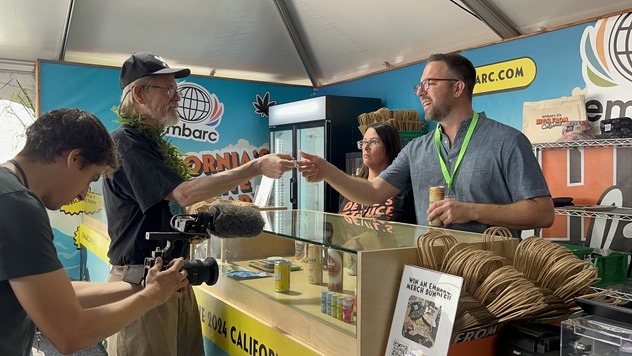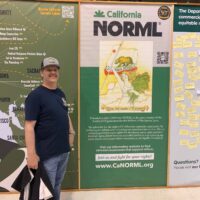Please donate to Cal NORML to support our advocacy work, as a regular or business member.
PLEASE SUPPORT CAL NORML IN 2025
Cal NORML expects to be working harder than ever in 2025 to help fight off an automatic increase in state cannabis excise taxes from 15% to as much as 19%, triggered by a 2022 bill, AB 195, that ended the cannabis cultivation tax. To satisfy beneficiaries of cannabis tax money, the tax could be raised to make up for any losses from the cultivation tax being eliminated. Cannabis is already heavily taxed compared to comparable products, and the industry has suffered from overtaxation and regulation in competing against the ever-present illicit market. Read more.
Meanwhile, the California Dept. of Public Health is suggesting setting cannabis potency caps and other measures to hamper the legal industry, and anti-smoking groups are showing up at local meetings to fight against opening cannabis lounges and cafés. Another complication is the emergence of the intoxicating hemp industry. Join us and help fight these ever increasing and complex fights for cannabis consumers’ rights!
Please support Cal NORML with a membership donation. Click Here to Donate.
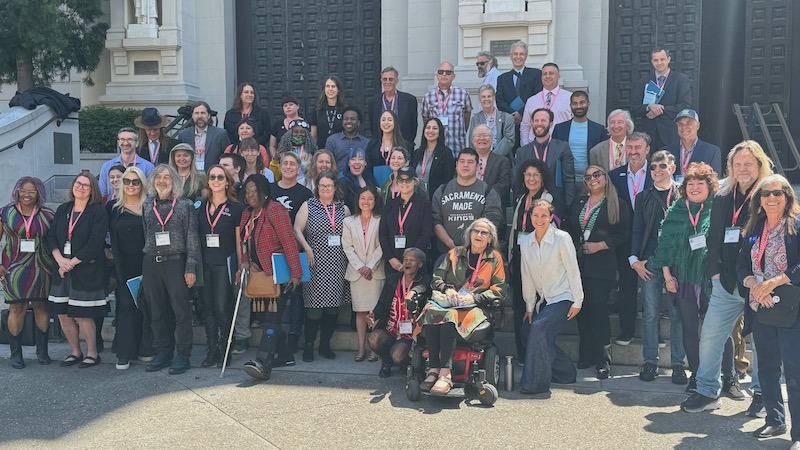
LEGISLATIVE GAINS
Once again this year, Cal NORML and its supporters actively lobbied on 30-40 bills affecting California cannabis consumers and the industry. We generated over 2500 letters from supporters to lawmakers though our Action Alert network, and scheduled 200 constituent meetings with lawmakers at our annual Lobby Day in May (pictured).
Cannabis Cafés Legalized
Signed into law this year was the Cal NORML-sponsored cannabis café bill AB 1775 (Haney), to allow licensed cannabis lounges to sell non-alcoholic food and drinks, as well as tickets to onsite concerts, with local government approval. Cal NORML supporters sent in over 700 letters of support for AB 1775 to their lawmakers and the Governor. “We thank Governor Newsom for this much-needed support of social use by California’s cannabis consumers, as well as for supporting the state’s cannabis industry in this way,” said Cal NORML director Dale Gieringer.
A previous version of Haney’s bill, AB 374, was vetoed last year by Governor Newsom, who urged in his veto message that the bill be reintroduced with more protections for cannabis workers. This year, Asm. Haney reintroduced it with the support of the United Food and Commercial Workers to ensure cannabis lounge workers are protected from secondhand smoke impacts at work. The Governor’ signing statement on AB 1775 contained some cautionary words to local governments about making sure workers are protected.
The law will take effect on January 1, 2025. Much enthusiasm has been expressed by California’s cannabis consumers, who look forward to enjoying food and socializing along with their cannabis experience. Now is the time for activists to get involved with their local NORML chapters to ensure that local governments will allow cannabis cafés within their borders. Read more.
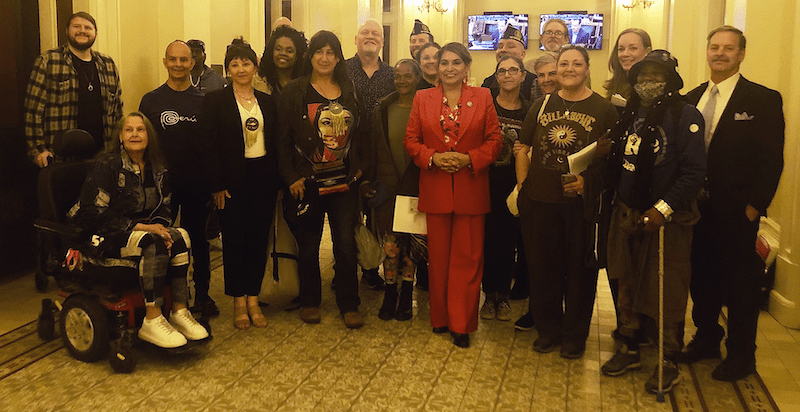
Cannabis Compassion Bill Passes
Governor Newsom also signed AB 2555, a medical cannabis compassion bill by Asm. Sharon Quirk-Silva (Fullerton). The bill renews a program allowing dispensaries to make tax-free donations of cannabis to needy medical patients.
The high cost of medical cannabis, particularly its taxation, has made it impossible for many patients who are financially challenged to obtain a sufficient and steady supply of their medicine. SB 34 (Weiner, 2019), exempted cannabis donated to financially challenged patients from taxation. Provisions of that law were set to expire in March of 2025. AB 2555 extends these critical donation programs for another five years.
Veterans groups, patient advocates, and Cal NORML testified in its favor at key hearings to win support for the bill. Nearly 1000 letters were sent in on this bill from Cal NORML supporters. Thanks to all who took action!
Tax Reform Bill Succeeds
The governor also signed SB 1059 (Bradford), to end double taxation of cannabis by local governments. The bill ended a practice whereby some local governments, notably Los Angeles, included the state sales and excise taxes in the base price used to assess their own local taxes on cannabis.
The bill sailed through the Senate and Assembly on unanimous votes. Testifying in favor, Cal NORML director Dale Gieringer spoke about the unfairness of double taxation of cannabis. Addressing the committee analysis’s contention that only LA is doubly taxing cannabis, he showed a receipt from a Northern California dispensary that included state excise and sales taxes in calculating local taxes.
Cannabis is already heavily overtaxed relative to comparable goods in California. Compounding taxes simply leads to an artificially inflated purchase price and incentivizes consumers to purchase cannabis from the unlicensed, untested, and untaxed market.
BILLS THAT WERE STOPPED, STALLED OR CHANGED
• Newsom vetoed AB 1111 by Asm. Gail Pellerin (Santa Cruz), to allow small farmers to sell cannabis directly to consumers at farmers’ markets, a bill supported by Cal NORML. In his veto message, he wrote, “I remain open to considering a more flexible and narrowly focused version of this bill next year.”
• SB 1264 (Grove), which sought to exclude law enforcement employees from employment rights and drug testing protections in the 2022 Cal NORML-sponsored bill AB 2188, failed to advance after Cal NORML, UFCW, and SEIU objected to it. It was fun lobbying on this one at Lobby Day; as one attendee put it, “We like weed so much we lobbied for cops to be able to use it!”
• Two enforcement bills Cal NORML opposed, AB 2850 (Rodriguez), which would have refelonized the cultivation of seven or more cannabis plants, and AB-2296 (Villapudua), to add sentencing enhancement for illegally manufacturing concentrated cannabis if it occurs in a structure where a child under 16 years of age is present, did not advance.
• SB 1498 (Ashby), which requires a manufacturer, distributor, or seller of industrial hemp to comply with restrictions against advertising and marketing to minors, was signed into law. Cal NORML supported amending this bill to include hemp companies and illegal operators.
• AB 1610 (Jones-Sawyer), to improve DCC detection of faulty testing labs that were allowing contaminated products onto the market, stalled this year. Cal NORML was asked to sponsor this bill in light of reports that some labs were failing to report pesticides and other contaminants in certain products. In the end, the bill was held back by the Senate Appropriations Committee on grounds of cost. However, discussions and publicity around the bill succeeded in prompting DCC to improve its lab surveillance and start recalling products tainted by pesticides and other contaminants.
• Also not advancing this year was AB-2223 (Aguiar-Curry), which aimed at limiting the proliferation of unlicensed, intoxicating hemp-derived products in California and providing a pathway to carry hemp products at cannabis retailers. The bill attracted controversy from all sides: the hemp industry, organic farmers, the licensed cannabis industry, consumers and medical users. In the end the bill stalled, prompting Gov. Newsom to issue emergency hemp regulations. Also see: Cal NORML Asks For Change in CDPH Hemp Regulations to Allow Non-Intoxicating Medicinal Hemp Products
ACTIVITIES AND PUBLICATIONS
As part of our our outreach to cannabis consumers and businesses, Cal NORML tabled at the California State Fair in July, meeting enthusiasts from across the state who came to purchase and consume cannabis for the first time at the fair. By all measures, the nation’s first-ever cannabis consumption space at a state fair was a huge success, and augurs well for seeing more of such events and spaces in California and elsewhere.
Cal NORML director Dale Gieringer (pictured) was the first person to make a legal cannabis purchase at the Fair on July 12. Two days later, Deputy Director Ellen Komp was among the first to experience the cannabis consumption lounge at the Fair.
Along with the new California Cannabis Historical Society, we also tabled at the Emerald Cup in Oakland, where NORML’s Founder Keith Stroup received a Lifetime Achievement Award.
Voting Guide
For the November 2024 election, Cal NORML published a voting guide to key state and federal races, with links to extensive information we included in NORML’s Smoke the Vote Guide, listing candidates’ votes on key cannabis legislation, and stated positions on legalization. We sent out a survey to candidates in key races, and provided the results to voters.
In our 2023 Membership Survey, 47% of respondents said their vote is “Always” strongly influenced by a candidate’s position on marijuana, and another 34% said it “Usually” is. Also, 63% said they consulted our 2022 voter guide.
CHS Fact Sheet
In November 2024, NORML published a Fact Sheet on CHS (Cannabis Hyperemesis Syndrome) researched and written by Cal NORML director Dale Gieringer in the wake of reports of increasing prevalence of the condition.
CHS typically occurs in subjects who chronically consume large doses of THC over periods of months to several years. Subjects experience episodic attacks of nausea, vomiting, and abdominal pain, sometimes lasting 24 hours or more.
The bottom line for consumers: avoid chronic, intensive use of THC-rich cannabis, such as dabs, infused pre-rolls, and hashish or vape concentrates. If you experience episodic attacks of nausea, vomiting and intestinal cramps, try abstaining from cannabis rather than escalating your consumption.
Responses to CDPH Hemp Regulations and Report on High-Potency Cannabis
In a letter to the California Office of Administrative Law and Department of Public Health, Cal NORML has asked that Gov. Newsom’s proposed emergency regulations banning the sale of hemp products be modified to allow continued sale of non-intoxicating hemp CBD extracts that are widely used by medical patients in California.
The letter does not take issue with the regulations’ intent to block the sale of hemp products with intoxicating levels of THC in liquor stores, gas stations, smoke shops and convenience outlets, often with inadequate labeling and in a manner accessible to minors. However, it calls the proposed regulations too restrictive in banning industrial hemp with any “detectable amount of THC.” Read more.
A new report on high-potency cannabis by the California Department of Public Health makes several key recommendations aimed at reducing access to high-potency products. The report blames high-potency products for a rising incidence of cannabis use disorder (habitual overuse), cannabis psychosis, hyperemesis syndrome, emergency room visits, and frequent use by youth under 21. Upon review of the report, Cal NORML takes issue with a number of the CDPH’s recommendations.
ONGOING CAMPAIGNS
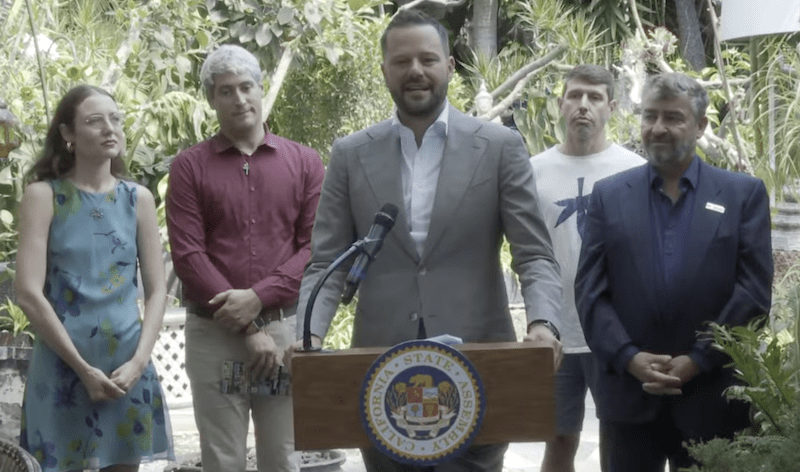
EXPANDING CANNABIS CONSUMPTION SPACES AND PROTECTING RENTERS’ RIGHTS
Much as we spent decades fighting faulty war-on-drugs rhetoric at local, state, and national levels, Cal NORML has been working to counter misinformation spread by the state’s powerful anti-smoking lobby, richly funded by the tobacco tax. They argue that second-hand marijuana smoke is as dangerous as tobacco smoke and poses unacceptable hazards to people in neighboring apartments, and for workers and patrons at cannabis consumption spaces and events.
In a victory for cannabis consumers, the Oakland City Council on November 12 voted 6-0 to exempt cannabis from a proposed total ban on residential smoking and vaping in multi-unit dwellings, including condominiums. “The anti-tobacco lobby is blowing smoke about marijuana,” argued Cal NORML director Dale Gieringer in testimony before the council. “Marijuana smoke is clearly safer than tobacco. It doesn’t cause cancer even in first-hand users, according to the National Academy of Sciences.”
The following week in the City of Sacramento, Cal NORML helped turn out support for a five-year pilot program allowing for cannabis consumption lounges in the city. By a 5-4 vote, both Type 1 licenses, allowing for noninhaled cannabis lounges (drinks and edibles) and Type 2 licenses, allowing for smoking and vaping at lounges, were approved.
In an effort to encourage more localities to allow for cannabis consumption spaces and cafés, Cal NORML compiled a list of cannabis consumption lounges in California to share with our members and supporters. Help us make cannabis consumption allowed across California!
EMPLOYMENT RIGHTS AND PATIENTS’ RIGHTS AWARENESS CAMPAIGNS
California workers are now protected from employment discrimination for off-the-job use of marijuana under a new law sponsored by Cal NORML—Government Code 12954—took effect on January 1, 2024. Enacted under bill AB 2188 by Asm. Bill Quirk, the law bans employers from firing or refusing to hire workers based on drug tests that detect inactive cannabis metabolites—in particular, urine and hair tests, which can detect marijuana residues days or weeks after last use and have no relation to on-the-job impairment.
Another Cal NORML-sponsored bill, AB 1954 (Quirk 2022), protects the right of patients to medical treatment if they use marijuana, and the right of physicians and clinics to treat them. AB 1954 specifies that a positive drug test for cannabis should not in itself be the sole basis for denying medical treatment to a patient absent a medically significant reason.
Cal NORML has been fielding calls from employees and patients who are continuing to experience discrimination from their employers and doctors, and reaching out cannabis retailers to help raise awareness of their customers’ rights under AB 2188 and SB 700, which bans employers from asking about past marijuana use, and AB . We have developed informational flyers and Fact Sheets for Employers and Employees in both English and Spanish, and also for patients and doctors.
CAL NORML’S PRIORITIES FOR 2025
• Advocate for lower cannabis taxes in California, especially for medical users.
• Lobby Congress for federal descheduling, the SAFER banking act, and other reforms.
• Support opening cannabis consumption lounges in more localities, and allow them to serve food and beverages.
• Support users’ right to inhale cannabis in their own homes and rental units with landlord’s permission so long as they don’t expose neighbors to objectionable smoke.
• Continue to inform and advocate for workers about their employment rights under AB 2188, and medical patients about their rights under AB 1954, banning discrimination by doctors.
• Improve access to non-intoxicating hemp CBD products and hemp-derived medical products.
• Support consumer education on cannabis dosage and high-potency products, and more accurate product testing and labeling.
• Oppose policies that would unduly limit consumer choice or restrict personal use and cultivation.
PLEASE SUPPORT CAL NORML IN 2025
Now is the time to build on the progress we made in 2024! Please support Cal NORML with a membership donation. Click Here to Donate.

